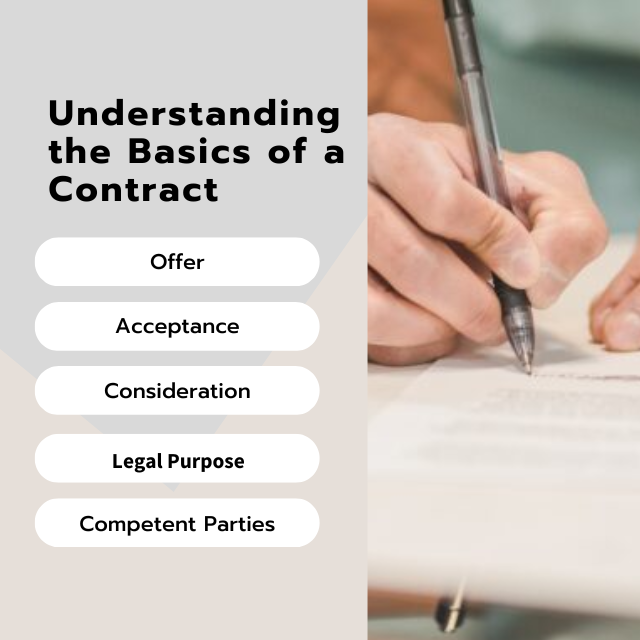In the world of business, contracts serve as the backbone of agreements, outlining rights, responsibilities, and expectations between parties. Whether you’re a seasoned entrepreneur or a newcomer to the business world, understanding how to draft a simple contract is essential for protecting your interests and ensuring clear communication between parties. In this beginner’s guide, we’ll walk you through the key steps and considerations to draft a simple yet effective contract.
Understanding the Basics of a Contract
Before diving into the drafting process, it’s crucial to understand the fundamental elements of a contract. A contract is a legally binding agreement between two or more parties, typically involving an exchange of goods, services, money, or promises. To be valid, a contract must include the following elements:

- Offer: One party must make a clear and specific offer to enter into an agreement.
- Acceptance: The other party must accept the terms of the offer without any modifications.
- Consideration: There must be something of value exchanged between the parties, such as goods, services, or money.
- Legal Purpose: The contract’s purpose must be legal and not violate any laws or public policies.
- Competent Parties: Both parties must have the legal capacity to enter into the contract, meaning they must be of sound mind and legal age.
Identifying the Parties and Purpose
The first step in drafting a simple contract is identifying the parties involved and clearly stating their roles and responsibilities. Begin by including the full legal names and addresses of all parties to the contract. Clearly define the purpose of the contract and outline the specific goods, services, or obligations being exchanged.
Defining the Terms and Conditions
Next, define the terms and conditions of the agreement in clear and concise language. Specify the rights and obligations of each party, including deadlines, payment terms, delivery schedules, and any other relevant details. Be as specific as possible to avoid ambiguity and misunderstandings later on.
Including Important Clauses
Certain clauses are essential in most contracts to protect the interests of both parties. Some common clauses to consider including in your simple contract are:
- Confidentiality Clause: Protects sensitive information shared between parties from being disclosed to third parties.
- Indemnity Clause: Specifies which party will be responsible for any losses, damages, or liabilities that may arise during the course of the contract.
- Termination Clause: Outlines the circumstances under which either party can terminate the contract and the procedures for doing so.
- Dispute Resolution Clause: Specifies how disputes between parties will be resolved, whether through mediation, arbitration, or litigation.
Seeking Legal Review
Once you’ve drafted your contract, it’s essential to have it reviewed by a legal professional to ensure its enforceability and compliance with relevant laws and regulations. A lawyer can provide valuable insights and recommendations to strengthen your contract and protect your interests.
Finalizing and Signing the Contract
After making any necessary revisions based on legal feedback, it’s time to finalize and sign the contract. All parties should carefully review the document to ensure they understand and agree to its terms. Once everyone is satisfied, the contract should be signed and dated by all parties involved. Consider using electronic signature platforms for convenience and efficiency.
Maintaining Clear Communication
Throughout the contract negotiation and drafting process, clear communication between parties is essential. Be open to discussing any concerns or questions that arise and be willing to negotiate terms that are fair and equitable for all parties involved. Remember, the goal of a contract is to establish mutual understanding and cooperation, not to create barriers or conflicts.
Drafting a simple contract doesn’t have to be daunting, even for beginners. By following the steps outlined in this guide and seeking professional advice when needed, you can create a clear, concise, and enforceable contract that protects your interests and fosters positive business relationships. Remember, clear communication, attention to detail, and a willingness to collaborate are key to successful contract drafting. With practice and experience, you’ll become more confident in navigating the intricacies of contract law and negotiation.
Did you find this Legitt article worthwhile? More engaging blogs about smart contracts on the blockchain, contract management software and electronic signatures can be found in the Legitt Blogs section. You may also contact Legitt to hire the best contract lifecycle management services and solutions.
FAQs on How to Draft a Simple Contract
What is a simple contract?
A simple contract is a legally binding agreement between parties that outlines their rights, obligations, and expectations in clear and concise terms.
What elements are essential in a simple contract?
Essential elements include offer, acceptance, consideration, legal purpose, and competent parties.
Why is it important to define the parties and purpose?
Defining parties and purpose clarifies roles and responsibilities, ensuring mutual understanding and agreement.
What should be included in the terms and conditions?
Include specifics like deadlines, payment terms, delivery schedules, and any relevant details to avoid ambiguity.
What are some common clauses to include?
Common clauses include confidentiality, indemnity, termination, and dispute resolution clauses.
Why is legal review necessary?
Legal review ensures enforceability and compliance with laws and regulations, offering valuable insights and recommendations.
How should the contract be finalized and signed?
All parties should carefully review, sign, and date the contract, either manually or using electronic signature platforms.
How can clear communication help in the process?
Clear communication fosters understanding, collaboration, and resolution of concerns or questions that arise during drafting.
What is the goal of drafting a simple contract?
The goal is to establish mutual understanding, cooperation, and protection of interests, fostering positive business relationships.
What if I need further assistance with contract drafting?
Seeking professional advice from legal experts can provide guidance and ensure confidence in navigating contract complexities.

